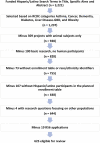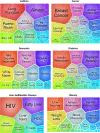Funding of Hispanic/Latino Health-Related Research by the National Institutes of Health: An Analysis of the Portfolio of Research Program Grants on Six Health Topic Areas
- PMID: 33014952
- PMCID: PMC7493677
- DOI: 10.3389/fpubh.2020.00330
Funding of Hispanic/Latino Health-Related Research by the National Institutes of Health: An Analysis of the Portfolio of Research Program Grants on Six Health Topic Areas
Abstract
Hispanics/Latinos are expected to constitute 25% of the U.S. population by 2060. Differences in the prevalence of health risk factors, chronic diseases, and access to and utilization of health-care services between Hispanics/Latinos and other populations in the U.S. have been documented. This study aimed to describe and analyze the landscape of Research Program Grants (RPGs) funded by the National Institutes of Health (NIH) between 2008 and 2015 involving Hispanic/Latino health research in six health condition areas-asthma, cancer, dementia, diabetes, liver/gallbladder disease, and obesity-and to identify opportunities for continued research in these areas. Using an NIH internal search engine, we identified new and renewal Hispanic/Latino health RPGs searching for specific Hispanic/Latino identifiers in the Title, Abstract, and Specific Aims. We used descriptive statistics to examine the distribution of funded RPGs by NIH disease-based classification codes for the six health condition areas of interest, and other selected characteristics. The most prominent clusters of research subtopics were identified within each health condition area, and performance sites were mapped at the city level. Within the selected time frame, 3,221 Hispanic/Latino health-related unique RPGs were funded (constituting 4.4% of all funded RPGs), and of those 625 RPGs were eligible for review and coding in the present study. Cancer and obesity were the most commonly studied health condition areas (72%), while studies on mechanisms of disease-biological and non-biological-(72.6%), behavioral research (42.1%) and epidemiological studies (38.1%) were the most common types of research. Most of the primary performance sites were in California, Texas, the northeastern U.S., and Illinois. The predominance of mechanistic, behavioral, and epidemiological studies in our analysis poses opportunities to evaluate knowledge gained and their clinical application, explore new research questions, or to update some methods or instruments. The findings of the present study suggest opportunities to expand research in understudied mechanisms of disease that could explain differences in prevalence of conditions like diabetes and cancer among different heritage groups. In addition, our findings suggest that the impact of interventions or policies designed to reduce health disparities, innovative multi-level interventions, implementation and dissemination studies, the role of health information technology on health outcomes, and the intersectionality of individual, sociocultural, geographic, and other factors on health outcomes, among others, are understudied approaches, which could potentially advance research in Hispanic/Latino health and contribute to the achievement of better health outcomes in this diverse population.
Keywords: Hispanics; Latinos; asthma; cancer; dementia; diabetes; liver disease; obesity.
Copyright © 2020 Avilés-Santa, Hsu, Lam, Arteaga, Artiles, Coady, Cooper, Curry, Desvigne-Nickens, Nicastro and Rosario.
Figures





References
-
- Features FF. Hispanic Heritage Month 2019 United States Census Bureau. (2019). Available online at: https://www.census.gov/newsroom/facts-for-features/2019/hispanic-heritag... (accessed May 28, 2020).
-
- Krogstad JM, Noe-Bustamante L. 7 Facts for National Hispanic Heritage Month. Pew Research Center; (2019). Available online at: https://www.pewresearch.org/fact-tank/2019/10/14/facts-for-national-hisp... (accessed May 28, 2020).
MeSH terms
LinkOut - more resources
Full Text Sources

